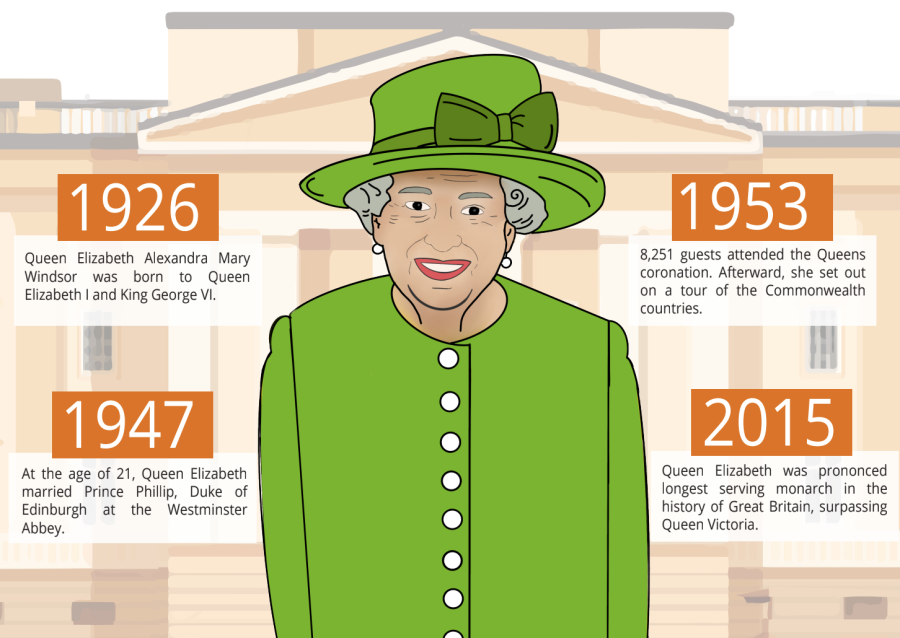The complex legacy of Queen Elizabeth II
Queen Elizabeth had an eventful reign as a public figure. Her death on Sept. 8 has left Great Britain in a state of grief as people reflect on her past.
October 10, 2022
For nearly a century, Queen Elizabeth Ⅱ impacted millions as the head of state in the UK and faced many controversies as a public figure. Her death on Sept. 8 has left Great Britain in a state of grief as people across the world reflect on her eventful reign and the British monarchy.
“Seventh years is a long time and the Queen was one of the last remaining links to the WW 2 generation,” Economics teacher David Pugh said. “The Queen also became perhaps the most recognizable person in the world, a very familiar and constant presence.”
The King or Queen is given the title of head of state, granting them the power to appoint a prime minister. But as the last failed attempt to exercise this power took place in 1834, their authority is now mainly nominal, leaving them with limited true power.
These restrictions on the monarch’s power have been in the English government for centuries. Most major changes and decisions have been made by Parliament, the primary law-making establishment in Great Britain, due to documents like the Magna Carta, that limit the power of the crown and give the people jurisdiction over their governance.
Consisting of the House of Commons and the House of Lords, Parliament oversees the government’s actions, discusses the nation’s most pressing issues, passes new laws, and sets taxes for the people. While the royal family gives input in the forming of these decisions, their authority is restricted, so instead, they stay involved in the country by attempting to use their influence in different ways that benefit the nation.
“The people in the British government try to use the Queen to put the monarchy in a positive light,” sophomore Hao Gu said. “They feature her in videos, making her seem approachable and friendly, hoping to paint the country in a more appealing way.”
A symbolic figurehead with no political or executive role, the royal family is still respected and admired by the people of Great Britain, who find themselves looking to their monarchs for counsel and reassurance during hardship.
Queen Elizabeth II succeeded the throne after her father’s death in 1952 when she was 25, becoming the ruler of the Commonwealth countries, including Canada and Australia. Before then, she worked as an army mechanic during World War II, while her father King George VI actively participated in the military during the war, holding the position of Admiral of the Fleets, Field Marshal and Marshal of the Royal Air Force.
Although initially not expected to rule, she became the heir after her uncle’s abdication. During her reign, Queen Elizabeth II traveled across the globe, meeting with generations of celebrities from across the world ranging from Marylin Monroe to Serena Williams. While most of her job was ceremonial due to her lack of political power, important events included her visits to other countries and with other state leaders.
Her trip to West Germany in 1965 was the first state visit by a British monarch to the country in over 50 years, celebrating the 20th anniversary of the end of World War II, and improving the post-war relationships between the two European powers. Her visit to the Republic of Ireland in 2011 was also historic. Given the complicated and bloody history between the two countries, the visit showed the easing of tensions between them after the turmoil in the 1990s.
“When the Queen made her opening remarks in Gaelic at a banquet in Ireland, the room erupted in warm applause, and the Irish President said ‘wow!’,” Pugh said. “That gesture changed relations between Britain and Ireland in a way that no politician could have pulled off and this year, she actually had a higher approval rating among Irish citizens than any political leader, which is pretty astonishing.”
Much of the controversy surrounding the Queen dealt with issues in the royal family. In 1992, she had her ‘annus horribilis’ — horrible year in Latin — as three of her children received divorces and a fire destroyed parts of Windsor Castle. She also received backlash for not immediately going into mourning after Princess Diana’s death. Nevertheless, she remained popular in the United Kingdom throughout her reign.
Many also view the monarchy as a relic of the United Kingdom’s colonial past.
There have been many missed opportunities for the monarchy to enhance its moral capital by helping to heal the wounds of colonialism, for instance, by returning artifacts stolen from former colonies, including those in the Crown jewels,” said Stanford History Professor Priya Satia. “Also, a lot of the racial dynamics that sustained imperialism continued even within the Queen’s household.”
In recent years, however, citizens have started to question the necessity of supporting the royal family’s extravagant lifestyle. In 2022, taxpayers provided €86.3 million due to the Sovereign Grant Act, a means of supporting the sovereign by financing the central staff, running the expenses of the official household and covering the cost of the royal family’s travels for official engagements.
The sovereign also receives permission to use a selection of the public revenue for their own private expenses. With 25% of the Crown Estate’s profits being dedicated to funding the Queen’s official duties, many are struggling to understand if the royal family serves them well enough for what they cost the common people. However, despite the costs, royal family tourist attractions generated $50 Billion in revenue for the UK from tourism.
“The royal family shouldn’t exist on government funds,” Gu said. “The entire family seems to only exist for the press and the Queen’s just wasting taxpayers’ money. On the other hand, people flock to watch the royal family events they pay for, and often use it as an escape from their daily lives.”
Debates over the value of the monarchy have led to questions about its future role. Many Commonwealth realms have kept Queen Elizabeth II as a ceremonial ruler, but her passing has left some countries wondering if they should continue having the monarch as their head of state or change to republics. Barbados was the most recent country to remove the monarchy, with other countries, such as Jamaica, planning on starting discussions on doing the same.
“The Queen was the former head of the Commonwealth,” Satia said. “There are 56 countries in the Commonwealth and only 15 of them take the British monarch as their head of state. But, some of these may become republics after the Queen’s death
Meanwhile, the newly crowned King Charles III remains deeply unpopular with an approval rating of 60%, much less than the Queen’s approval of around 80%, and other members of the royal family, due to issues such as his divorce from Princess Diana and a charity scandal in 2021. His negative portrayal on the TV show “The Crown” furthered many people’s poor opinions. Some citizens believe that he is too old to rule and should abdicate for his son, Prince William. He also appears to be more involved in politics than his mother, which could further divide the country. However, Charles III has been a champion of environmental issues and has an increased focus on climate change prevention, possibly bringing the UK to a greener future.
“The Monarchy has a role that is not about politics but a symbol of unity, not just for a diverse United Kingdom but also as head of the Commonwealth,” Pugh said. “The monarchy will change as the Queen had a popularity and ‘soft power’ that will be very difficult for any successor to match.”



































































